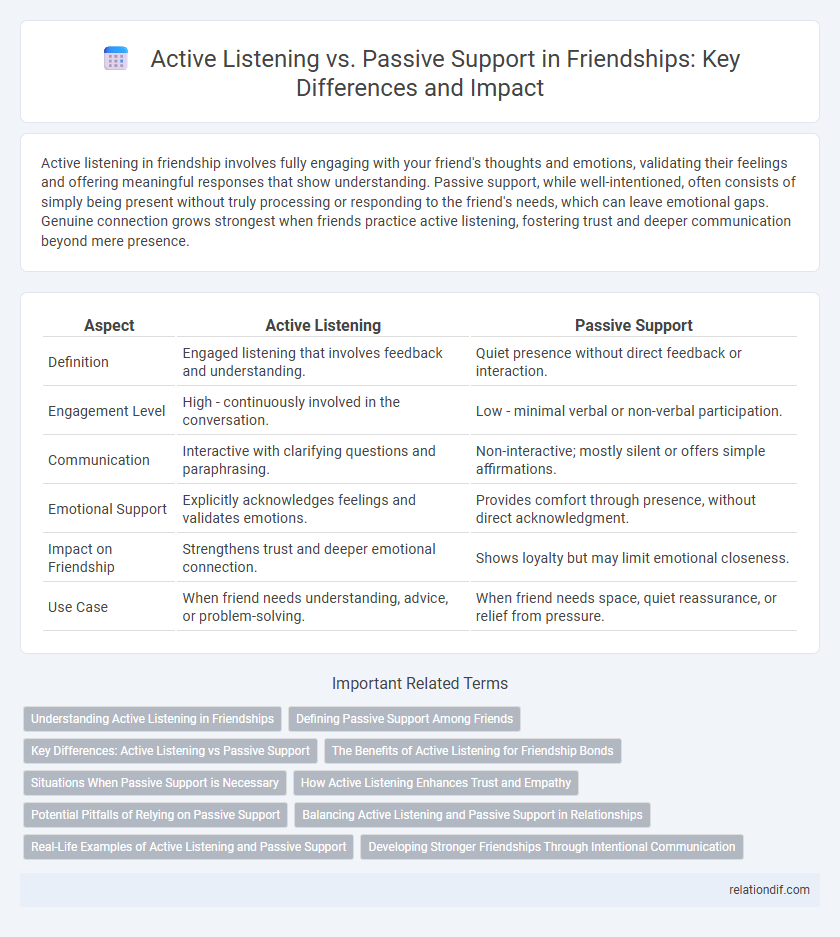Active listening in friendship involves fully engaging with your friend's thoughts and emotions, validating their feelings and offering meaningful responses that show understanding. Passive support, while well-intentioned, often consists of simply being present without truly processing or responding to the friend's needs, which can leave emotional gaps. Genuine connection grows strongest when friends practice active listening, fostering trust and deeper communication beyond mere presence.
Table of Comparison
| Aspect | Active Listening | Passive Support |
|---|---|---|
| Definition | Engaged listening that involves feedback and understanding. | Quiet presence without direct feedback or interaction. |
| Engagement Level | High - continuously involved in the conversation. | Low - minimal verbal or non-verbal participation. |
| Communication | Interactive with clarifying questions and paraphrasing. | Non-interactive; mostly silent or offers simple affirmations. |
| Emotional Support | Explicitly acknowledges feelings and validates emotions. | Provides comfort through presence, without direct acknowledgment. |
| Impact on Friendship | Strengthens trust and deeper emotional connection. | Shows loyalty but may limit emotional closeness. |
| Use Case | When friend needs understanding, advice, or problem-solving. | When friend needs space, quiet reassurance, or relief from pressure. |
Understanding Active Listening in Friendships
Active listening in friendships involves fully engaging with the speaker through eye contact, nodding, and paraphrasing to ensure clear understanding and emotional validation. Unlike passive support, which may simply acknowledge feelings superficially, active listening fosters deeper trust and empathy by encouraging open communication and reducing misunderstandings. Research in social psychology highlights that active listening enhances relationship satisfaction and strengthens emotional bonds between friends.
Defining Passive Support Among Friends
Passive support among friends involves offering non-intrusive presence and empathetic silence without engaging in direct problem-solving or active feedback. This form of support prioritizes creating a safe emotional space where the friend feels heard and understood without pressure to respond or act. Understanding the nuances of passive support enhances the emotional depth of friendship by validating feelings through attentive but unobtrusive companionship.
Key Differences: Active Listening vs Passive Support
Active listening involves fully concentrating, understanding, and responding thoughtfully to a friend's words, fostering deeper emotional connection and trust. Passive support, by contrast, often means being available without engaging intensively, which may provide comfort but lacks the interactive depth of active listening. Recognizing these differences helps strengthen friendships by balancing empathetic engagement with respectful presence.
The Benefits of Active Listening for Friendship Bonds
Active listening enhances friendship bonds by fostering deeper understanding and trust, allowing friends to feel genuinely heard and valued. This intentional engagement promotes emotional connection and reduces misunderstandings, strengthening the overall relationship. By focusing on verbal and non-verbal cues, active listening cultivates empathy and mutual support, essential for lasting friendships.
Situations When Passive Support is Necessary
In moments of grief or emotional overwhelm, passive support allows friends to offer a comforting presence without forcing conversation, respecting personal space and emotional processing. Situations involving trauma or anxiety often require silence and attentiveness rather than advice, demonstrating empathy through nonverbal cues such as nodding or gentle touch. Passive support fosters trust and safety, letting individuals feel seen and understood without pressure to articulate feelings immediately.
How Active Listening Enhances Trust and Empathy
Active listening strengthens friendship by fully engaging in conversations, which cultivates deeper trust and empathy between individuals. This focused attention allows friends to feel genuinely understood and valued, fostering emotional connection and mutual respect. In contrast to passive support, active listening encourages open communication and validates feelings, making the friendship more resilient and meaningful.
Potential Pitfalls of Relying on Passive Support
Relying on passive support in friendships may lead to misunderstandings and emotional distance, as passive listeners often miss critical cues and fail to offer meaningful feedback. Active listening, characterized by attentiveness, empathy, and responsive communication, fosters deeper trust and validation, preventing feelings of neglect or frustration. Without active engagement, friendships risk becoming one-sided, causing individuals to feel unsupported despite the presence of passive companionship.
Balancing Active Listening and Passive Support in Relationships
Balancing active listening and passive support in relationships enhances emotional connection by ensuring individuals feel both heard and understood. Active listening involves attentively engaging, asking clarifying questions, and reflecting feelings, while passive support offers presence and empathy without immediate response. Integrating both approaches fosters trust, reduces misunderstandings, and cultivates deeper, more resilient friendships.
Real-Life Examples of Active Listening and Passive Support
Active listening in friendship involves fully concentrating, understanding, and responding thoughtfully, such as when a friend shares work stress and you reflect their feelings and ask clarifying questions. Passive support often looks like offering generic advice or simple reassurance without engaging deeply, like saying "It'll be fine" without exploring underlying concerns. Real-life examples reveal active listening fosters trust and empathy, while passive support may leave emotional needs unmet.
Developing Stronger Friendships Through Intentional Communication
Active listening strengthens friendships by demonstrating genuine interest and empathy, fostering deeper emotional connections. Passive support often lacks engagement, which can lead to misunderstandings and weakened bonds. Prioritizing intentional communication through attentive listening encourages trust and mutual respect, essential for lasting friendships.
active listening vs passive support Infographic

 relationdif.com
relationdif.com